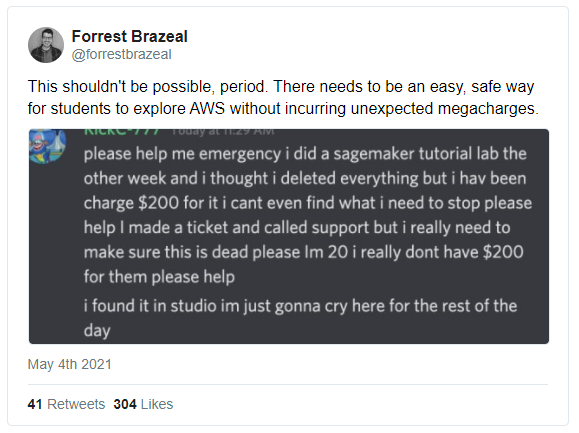But I've been impressed all day long by a post that appeared on A Cloud Guru 's Discord channel .

Transfer
, , , SageMaker , , 200 , , . , , , , 200 . , .
Forrest Brazil: , . AWS , .
Forrest Brazil: , . AWS , .
Lest you worry: everything is in order with the student, many volunteered to help, the AWS administration understands the situation.
But I can't get out of my head with a terrible story that happened in the midst of a pandemic with a young guy who died due to the erroneous notification that he lost several hundred thousand dollars in the Robinhood investment app. I keep asking myself: what if this student hadn't turned to the community for help? What if the AWS administration hadn't been bothered by Twitter and had only a few days to respond? What if the system continued to wind up debt, and the student continued to add to himself?
Too dramatizing? I guess what objections they could put forward to me.
This student himself had to be responsible for what unfolds
With all due respect, let's go without it. Even experienced programmers are not always in control, as the story of Bills heard round the world has shown . But at least they usually pay with corporate credit cards. Students who are trying to break into the realm of cloud computing have no financial cushion and cannot be fined for learning. I'm not even saying that training should be free! But it shouldn't be a game of reaction speed and money at the same time either.
It's only $ 200, not the end of the world.
Well, yeah, this time. And if this student, for example, inadvertently wrote the Lambda functionthat would apply the PUT and GET methods to the same object in S3 in an infinite loop? How would he know if something is wrong? He could have accumulated several thousand dollars of debt before the console had time to update the data.
In such cases, AWS technical support returns money without problems, there is nothing to be afraid of.
Now you know, and I know. And the twenty-year-old student, who had a $ 200 debt in front of his eyes, was not in the know. And how would he know? This troubleshooting scheme is not documented anywhere.
One way or another, you need to give the student his due - although he was in a panic, he was able to pinpoint two main problems with the current AWS approach to free accounts (which are either free or not, or we were joking, in general, good luck) :
- unexpected write-offs;
- impossibility to establish the purpose of these write-offs.
AWS is the only cloud provider that poses such problems. Azure, GCP and even Oracle suggest ways to limit the amount of write-offs and / or the ability to delete a project so that it is completely deleted.
At the same time, personally, I have an abandoned account on AWS, which pulls money from me. I'm sure you have too. I strongly doubt that I would be able to figure out what services they charge me for, despite the fact that I seem to have been awarded the title of AWS Hero. It would be easier to delete your account. Well, seriously, if the only way to pay off AWS for a project once and for all is to cut off your credit card and demolish your account, then from the point of view of user retention, this is somehow not very good.
Is there a solution?
Corey Quinn, the first and only person worth consulting about payments in AWS, urged the corporation to update the free plan: separate "personal accounts for training" and "accounts for young companies", prescribe different conditions for them and enable a hard limit debt, beyond which you can not go.
One could also think about accounts with a limited expiration date for the "sandbox", which would be automatically deleted after a specified period. This solution was successfully implemented by A Cloud Guru / Linux Academy in the Cloud Playgrounds project ... But, as a person who works at A Cloud Guru, I can happily tell you: AWS should have such functionality in the console, and not be completed by our efforts.
Addendum : Some readers pointed out to me that AWS Educate Starter accounts exist , which allow you to access a limited set of useful AWS services without entering your card details. The difficulty here is that only those who belong to an organization that cooperates with Amazon - for example, a school or a university - can create such an account. Perhaps, instead of reshaping the entire free plan, it is more realistic to expand this program - say, so that it skips everyone who is able to apply and show themselves not too much of a bot.
In the meantime, if none of these options can be implemented, then AWS should at least stop talking about its plans to train 29 million new programmers on its platform by 2025. Until these people are provided with a reliable way to learn without jeopardizing their own well-being, this is not only unrealistic, but also irresponsible.